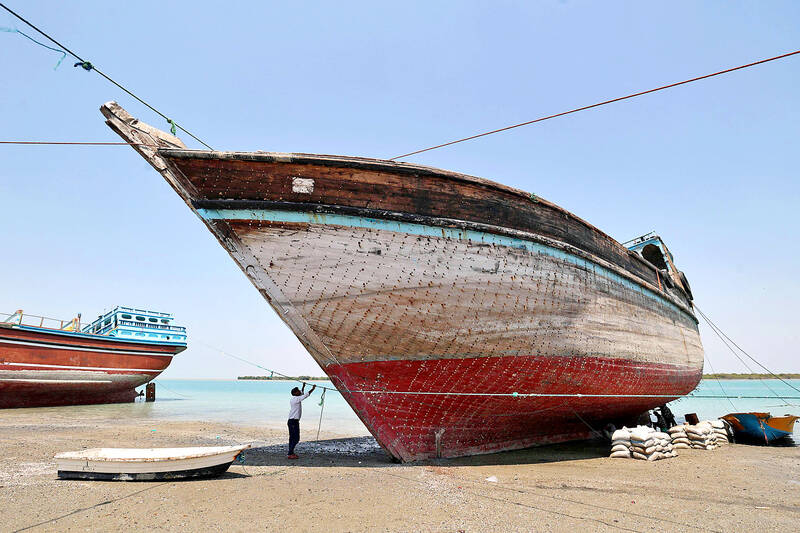Iranian captain Hassan Rostam has braved the Strait of Hormuz aboard his lenj for four decades, but now watches with despair as the wooden ships are being replaced by cheaper, faster boats.
The sturdy vessels, built by hand, have sailed Gulf waters for centuries, their potbellied silhouette emblematic of regional maritime traditions like the dhows of the Arabian Peninsula.
These days, “there are fewer and fewer” of them, said Rostam, 62, who has spent his life traveling the waterway between Iran and the United Arab Emirates.

Photo: AFP
With a lean body and weathered face, he gazes at the calm seas that are crisscrossed by huge tankers taking Gulf oil to the world’s markets, and naval vessels patrolling the strategic waterway.
Qeshm Island off Bandar Abbas is also home to the much older tradition of building wooden boats, about 30 of which were resting at low tide in the coastal village of Guran.
This small port has long housed several shipyards specializing in their maintenance and repair, but that morning, fewer than two dozen workers were there, barefoot in the mud.
A half-built lenj hull propped on beams would not be finished for lack of money, as its owner plans to dismantle it and use the boards for other projects.
“Today, a new lenj is very expensive,” because “the wood comes from abroad” and construction is done entirely by hand, said Ali Pouzan, who supervises the Guran site.
Each lenj is unique and the ships vary in size, with the craft “transmitted from generation to generation,” he said.
UNESCO back in 2011 recognized the lenj as intangible cultural heritage requiring “urgent safeguarding.”
As modern alternatives have taken the wind out of its sails, “the philosophy, the ritual context and the traditional knowledge linked to navigation in the Persian Gulf ... are gradually fading,” the UN body warned.
In their golden age, the rustic lenjes were used to transport cereals, dates, dried fish, spices, wood and textiles across the Gulf and as far as the coasts of East Africa and the Indian subcontinent.
Commercial shipping has been taken over by engine-powered boats made of fiberglass or steel, navigating the turquoise waters where huge oil tankers now roam.
Lenj vessels were also used for fishing, as well as the lucrative pearling tradition, which has nearly disappeared altogether.
Younes, a 42-year-old Guran resident, has been repairing lenjes in his native village for more than 20 years.
“It’s a painful job,” he said in the baking heat, as he used an old technique called “kalfat koobi” to waterproof a vessel with strips of cotton soaked in sesame and coconut oil.
Recognizing the demise of shipbuilding in Guran, Pouzan is betting on tourism instead, a promising sector on Qeshm as the island attracts a growing number of visitors.
“We have restored several boats to adapt them to sea trips,” he said.
An old ship was being repurposed into a cafe, and there are plans to transform the scenic port, with colored lenj hulls lying in the sand, into an open-air museum.
Near mangroves on the beach, Pouzan plans to build lenj-inspired huts for tourists. Each would bear the name of the most famous destinations the ships once reached — from Zanzibar and Mombasa to Kolkata.

Kehinde Sanni spends his days smoothing out dents and repainting scratched bumpers in a modest autobody shop in Lagos. He has never left Nigeria, yet he speaks glowingly of Burkina Faso military leader Ibrahim Traore. “Nigeria needs someone like Ibrahim Traore of Burkina Faso. He is doing well for his country,” Sanni said. His admiration is shaped by a steady stream of viral videos, memes and social media posts — many misleading or outright false — portraying Traore as a fearless reformer who defied Western powers and reclaimed his country’s dignity. The Burkinabe strongman swept into power following a coup in September 2022

‘FRAGMENTING’: British politics have for a long time been dominated by the Labor Party and the Tories, but polls suggest that Reform now poses a significant challenge Hard-right upstarts Reform UK snatched a parliamentary seat from British Prime Minister Keir Starmer’s Labor Party yesterday in local elections that dealt a blow to the UK’s two establishment parties. Reform, led by anti-immigrant firebrand Nigel Farage, won the by-election in Runcorn and Helsby in northwest England by just six votes, as it picked up gains in other localities, including one mayoralty. The group’s strong showing continues momentum it built up at last year’s general election and appears to confirm a trend that the UK is entering an era of multi-party politics. “For the movement, for the party it’s a very, very big

A new online voting system aimed at boosting turnout among the Philippines’ millions of overseas workers ahead of Monday’s mid-term elections has been marked by confusion and fears of disenfranchisement. Thousands of overseas Filipino workers have already cast their ballots in the race dominated by a bitter feud between President Ferdinand Marcos Jr and his impeached vice president, Sara Duterte. While official turnout figures are not yet publicly available, data from the Philippine Commission on Elections (COMELEC) showed that at least 134,000 of the 1.22 million registered overseas voters have signed up for the new online system, which opened on April 13. However,

ENTERTAINMENT: Rio officials have a history of organizing massive concerts on Copacabana Beach, with Madonna’s show drawing about 1.6 million fans last year Lady Gaga on Saturday night gave a free concert in front of 2 million fans who poured onto Copacabana Beach in Rio de Janeiro for the biggest show of her career. “Tonight, we’re making history... Thank you for making history with me,” Lady Gaga told a screaming crowd. The Mother Monster, as she is known, started the show at about 10:10pm local time with her 2011 song Bloody Mary. Cries of joy rose from the tightly packed fans who sang and danced shoulder-to-shoulder on the vast stretch of sand. Concert organizers said 2.1 million people attended the show. Lady Gaga